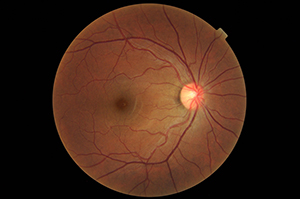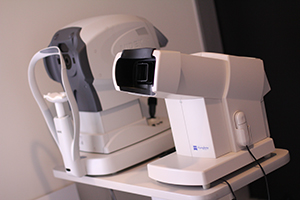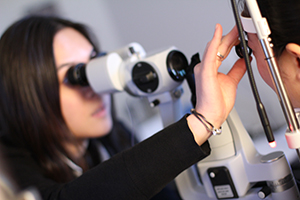Your Eyes Matter
Your eyes are important. Regardless of your age or physical health, it is essential to have regular eye exams. Even if you see perfect 20/20, you still need to check the health of your eyes.
A comprehensive eye exam consists of a number of tests to assess your vision, check for diseases (such as glaucoma, diabetic retinopathy, cataracts, macular degeneration) and to evaluate your quality of vision and overall health.
Many diseases have no symptoms in the early stages, but may later cause irreversible vision loss if left untreated. With early detection and treatment, vision loss can be prevented or minimized.
In our office, we use the newest technology to provide Digital Retinal Imaging and evaluate your peripheral vision through visual field testing during your visit.

Digital Retinal Imaging
We take a high-resolution digital photograph of the inside of the eye. By looking at the various structures of the retina including the optic nerve, blood vessels, and the macula, we can determine how healthy your eye is or if there are any problems that may need attention.
Patients with a history of diabetes, glaucoma, macular degeneration and other retinal disorders are recommended to have retinal imaging done during their annual eye exam as these photographs provide documentation and helps to monitor disease progression for future visits.

Visual Field Testing
This computer-aided test determines a patient’s horizontal and vertical range of peripheral or side vision. This quick and non-invasive test can detect the presence of a blind spot (Scotoma) or peripheral vision loss. A loss in peripheral vision or a scotoma could indicate glaucoma nerve damage, or other ocular and neuro-ophthalmological disorders such as a stroke or brain tumours.
Children
Experts estimate up to 25% of school aged children have vision problems. If not corrected at an early age, these vision problems may contribute to lazy eyes (Amblyopia), eye turns (Strabismus) or learning disabilities.
All children should see the eye doctor around age 3 or 4 before they start of school. Children should continue to have their eye examined once every year until adulthood. In Ontario, children 19 years and younger are covered for their eye exams by OHIP once every year.
Adults
It is also recommended for adults who wear eyeglasses or contact lenses to have annual eye exams. Adults with diabetes or high blood pressure or other disorders also require eye exams on a yearly basis as many diseases may affect vision and ocular health. Those who don’t normally wear vision correction, eye exams are still recommended every two years to check for common problems such as presbyopia and cataracts.
Seniors
Since the risk of eye disease continues to increase with age, everyone over 65 should be examined at least once per year. In Ontario, patients 65 and older are covered for their eye exam by OHIP once per year.
Book an Appointment
*Recommendations are from the Canadian Association of Optometrists frequency of eye examinations guideline.

